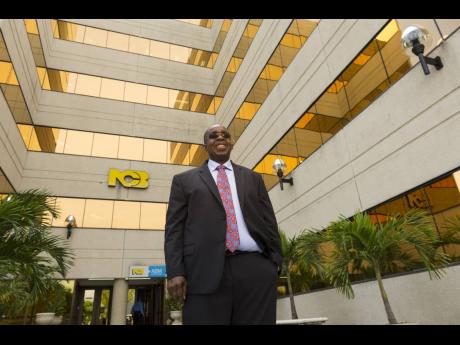Banks play e-commerce Santa this Xmas
In a move to make buying local easier for shoppers this Christmas, and consequently drive sales for small and micro ventures, businesswoman Angelie Spencer has partnered with the National Commercial Bank Jamaica Limited, NCB, and video company M-One Productions, to create a single platform that links buyers to the business page of hundreds of local entrepreneurs.
Typically, users of social media platforms would individually select business pages that match their lifestyle to follow. But Spencer’s online platform, called Shop Local JA, will instead expose users to micro and small businesses across several industries, at the click of a button.
The platform has financial backing from NCB.
In fact, Jamaica’s top two banks have signed on to initiatives that buttress small businesses in the e-commerce space, the majority of which lack the technological and financial capacity to develop online sales platforms, at a time when that is the space in which persons are increasingly inclined to shop amid the pandemic.
Scotiabank has joined hands with courier service company Rocketship, and, since November 27, has been touting a 15-per cent special to its banking customers. The offer, which runs until December 21, includes a 10 per cent discount on clearing costs for Rocketship customers, and another 5 per cent or a maximum of $2,000 in cash back on transaction fees when customers use their Scotiabank Aero Platinum Mastercard or Gold Mastercard for the transaction.
Efforts at comment from Scotia for more details on the arrangement were unsuccessful.
The deal in which NCB is involved sees the No. 1 banking group incorporating its payment button through a previous partnership it had with payment gateway business, Fygaro, which allows users to complete orders on platforms like Facebook, Instagram or WhatsApp.
The bank, which has been campaigning to Jamaicans to buy local this Christmas, has partnered with courier services MailPac Local, Molynes Express and CG Truck Parts and Accessories, and, through these businesses, also give customers the option to have goods delivered to their homes.
Efforts by the Financial Gleaner to get a comment on what it will cost vendors to utilise the platform were unsuccessful. But, for now, it is understood that companies looking to be featured on the Shop Local JA social media platforms can sign up for free, beginning Saturday, December 12.
Recent data from the Small Business Association of Jamaica, SBAJ, based on a survey it conducted among members, indicates that 35 per cent of business operators have closed their doors since the beginning of the pandemic in March, and approximately 60 per cent of the persons employed to these small businesses have lost their jobs.
Since then, business owners have been popping up on social media platforms like Instagram daily, in search of fresh revenue to supplement income lost during the COVID-19 pandemic, and in other cases, to keep business relevant in the switch to online transactions.
“It started with an Instagram post that I made, encouraging all Jamaicans to buy Christmas presents from local small entrepreneurs, to help them recover. The feedback was so overwhelming that I decided to take it further. I approached NCB to help make it happen, and, through our discussions, the idea Shop Local JA, as an online and virtual platform, came to life,” Spencer said in a press release.
The next step for Shop Local JA is the launch of a virtual marketplace which takes the form of an online forum where local vendors can sell their products to interested buyers through a third-party website or app. Ultimately, Spencer hopes the local initiative will grow to include a yearly event mimicking the Small Business Saturdays shopping holiday in the United States.
Shop Local JA’s currently has over 147 businesses registered on its online platform across the clothing, jewellery, personal care, photography, beauty, transportation and food industries.
Once logged on to the platform, viewers are able to connect to the online page of individual stores, add items to their basket and complete their payment using NCB’s payment button. Customers then have the option to have their items delivered to their homes or picked up in-store, using NCB’s delivery partners.
As part of its ‘Buy Local this Christmas’ campaign, NCB is also offering debit and credit cardholders discounts on orders exceeding $10,000, if goods are shipped with its courier partners.
The campaign also promotes use of the bank’s cards at some 55 other retail stores across several industries, and offers discounts of 5 per cent to 30 per cent with debit and credit card purchases.
Courier companies have been holding their own throughout the pandemic, with an upswing in the delivery market that has evolved concurrently with social-distancing restrictions implemented by the Government to keep COVID-19 cases low.
The e-commerce initiatives in which the banks are participants are likely to add to that growth in the peak Christmas season.
Additionally, the initiatives by the banks come alongside their own investments in digital services, as they too migrate transactions and customers online. It is in their interest to help their customers sustain business, so that the credit market, both in the form of new loans and repayment of borrowings, can thrive.
The pandemic has had a dramatic impact so far on earnings at the top two banks, because of write-downs and loan losses.
NCB Financial Group, parent company to NCB, saw its adjusted record $31 billion of profit diminish to less than $27 billion this year; while Scotia Group Jamaica, operator of Scotiabank Jamaica, reported on Wednesday that it shed more than 30 per cent of its profit, which fell from $13 billion to $9 billion at year ending October.




